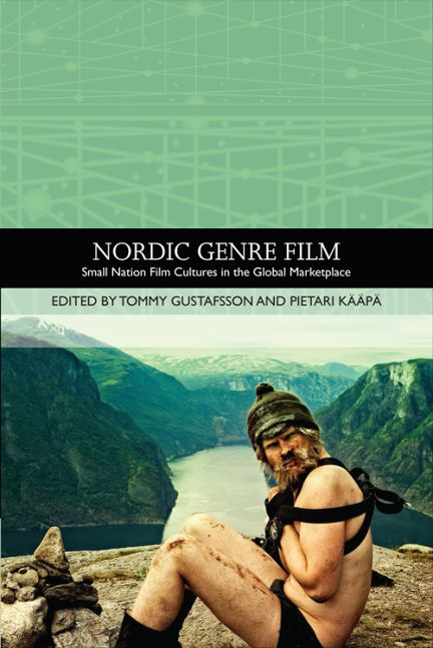Book contents
- Frontmatter
- Contents
- List of Illustrations
- List of Contributors
- Traditions in World Cinema
- Introduction: Nordic Genre Film and Institutional History
- PART I HERITAGE CINEMA AND NATIONAL NARRATIVES
- PART II CRIME AND DETECTIVE NARRATIVES
- 4 Crime Up North: The Case of Norway, Finland and Iceland
- 5 The Thrill of the Nordic Kill: The Manhunt Movie in the Nordic Thriller
- 6 Bridges and Tunnels: Negotiating the National in Transnational Television Drama
- 7 Stockholm Noir: Neoliberalism and Gangsterism in Easy Money
- 8 The Private Life of the Prime Minister? Politics, Drama and Documentary in Pääministeri and Palme
- PART III NORDIC OPTIMISM: ROAD MOVIES, COMEDIES AND MUSICALS
- PART IV NORDIC HORRORS
- PART V GENRE BENDERS
- Index
6 - Bridges and Tunnels: Negotiating the National in Transnational Television Drama
from PART II - CRIME AND DETECTIVE NARRATIVES
Published online by Cambridge University Press: 25 October 2017
- Frontmatter
- Contents
- List of Illustrations
- List of Contributors
- Traditions in World Cinema
- Introduction: Nordic Genre Film and Institutional History
- PART I HERITAGE CINEMA AND NATIONAL NARRATIVES
- PART II CRIME AND DETECTIVE NARRATIVES
- 4 Crime Up North: The Case of Norway, Finland and Iceland
- 5 The Thrill of the Nordic Kill: The Manhunt Movie in the Nordic Thriller
- 6 Bridges and Tunnels: Negotiating the National in Transnational Television Drama
- 7 Stockholm Noir: Neoliberalism and Gangsterism in Easy Money
- 8 The Private Life of the Prime Minister? Politics, Drama and Documentary in Pääministeri and Palme
- PART III NORDIC OPTIMISM: ROAD MOVIES, COMEDIES AND MUSICALS
- PART IV NORDIC HORRORS
- PART V GENRE BENDERS
- Index
Summary
As a global TV franchise, [The Tunnel] is pure gold: there's a US–Mexican version already screening and there are frontiers all over the world with tension and history dotted across the boundary. The South Korea–North Korea would be ace.
Keith Watson (2012)INTRODUCTION: NATIONS AND NATIONALISMS IN A ‘POSTNATIONAL’ WORLD
In a globalised world, the notions of neatly defined, homogeneous ethnies or national identities are difficult to sustain, especially if they are construed as organic features of social organisation and historical development. Instead, the present moment is characterised by hybridisation, multiculturalism and all manners of transnational movement, flux and entanglement. It has even been argued that we are now situated in a postnational condition, where the construction of supranationals, such as the European Union, and the transnational, ‘deregulated’, cross-border movement of capital, cultures and people is indicative of a decline of nations and traditional concepts of the national as key factors (Ezra and Rowden 2006: 1f.; see also Habermas 2001). Although the relation between the ‘transnational’ and the ‘postnational’ is not absolutely clear in this line of argument, the terms can be understood as connoting progressive stages in the decline of the national in the face of the challenges of globalisation (for example in Kaapa 2011: 14ff.). However, in the postnational condition more traditional or conservative ways of imagining the nation and national community simply will not make sense (Hedetoft and Hjort 2002). Modernist theories of nationalism hold that feelings of national belonging and community are constructed (‘imagined’) and sustained through mediated social communication (Deutsch 1966: 96–8 and 188; Gellner 1983: 127; Anderson 1991: 122). One implication of this for the contemporary postnational condition seems to be that national community remains a potent fiction; whereas postnational flux is the reality this fiction tries to disavow.
Indeed, on a political level, nations, conceptions of national specificity and nationalisms are still very real, and loom large in the mobilisation of various groups (conceived as, precisely, national, or ethnic, religious or otherwise designated) for political action (Juergensmeyer 2002: 3–8). Current development in Europe and elsewhere makes this abundantly clear.
- Type
- Chapter
- Information
- Nordic Genre FilmSmall Nation Film Cultures in the Global Marketplace, pp. 91 - 103Publisher: Edinburgh University PressPrint publication year: 2015



